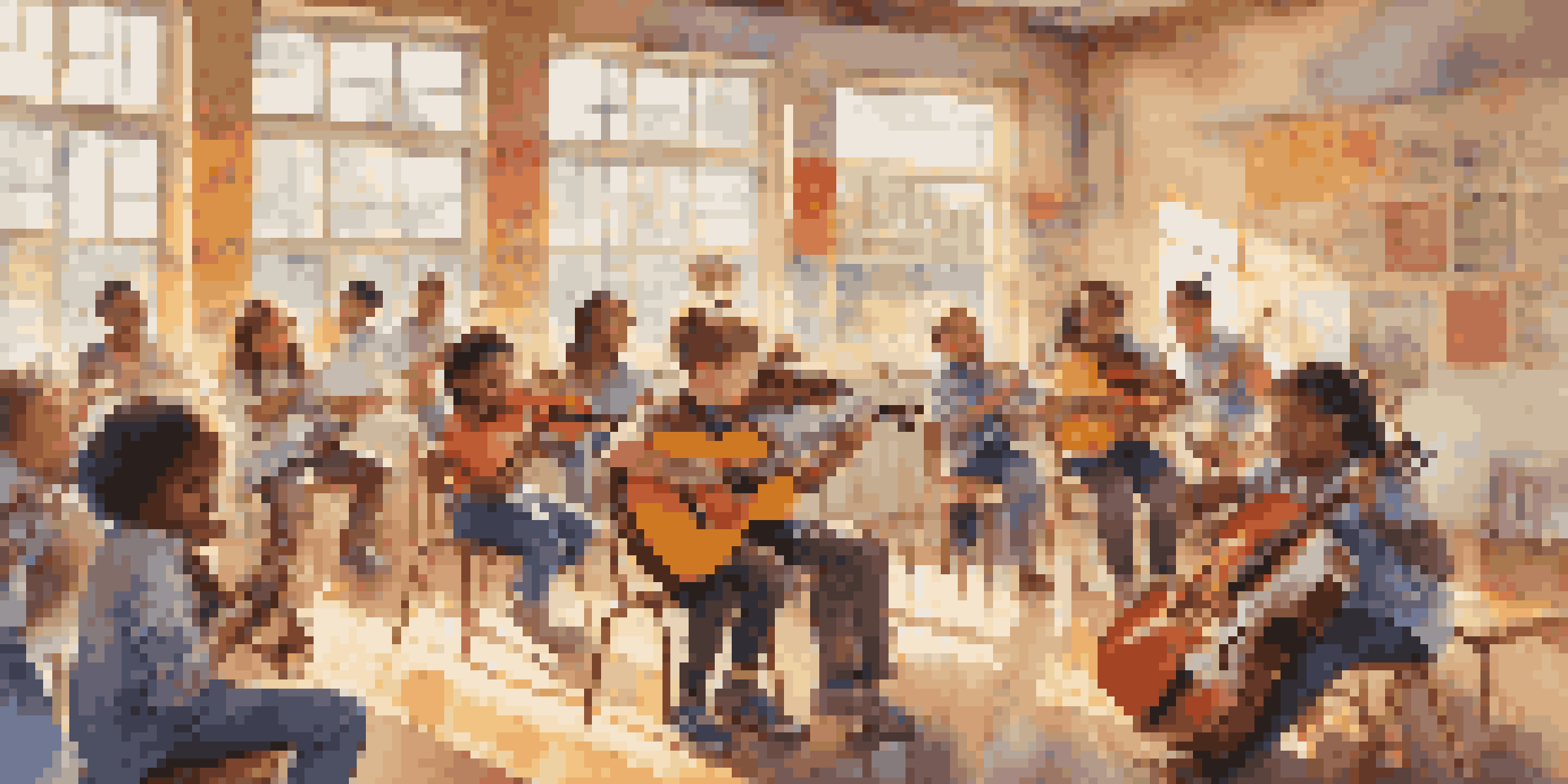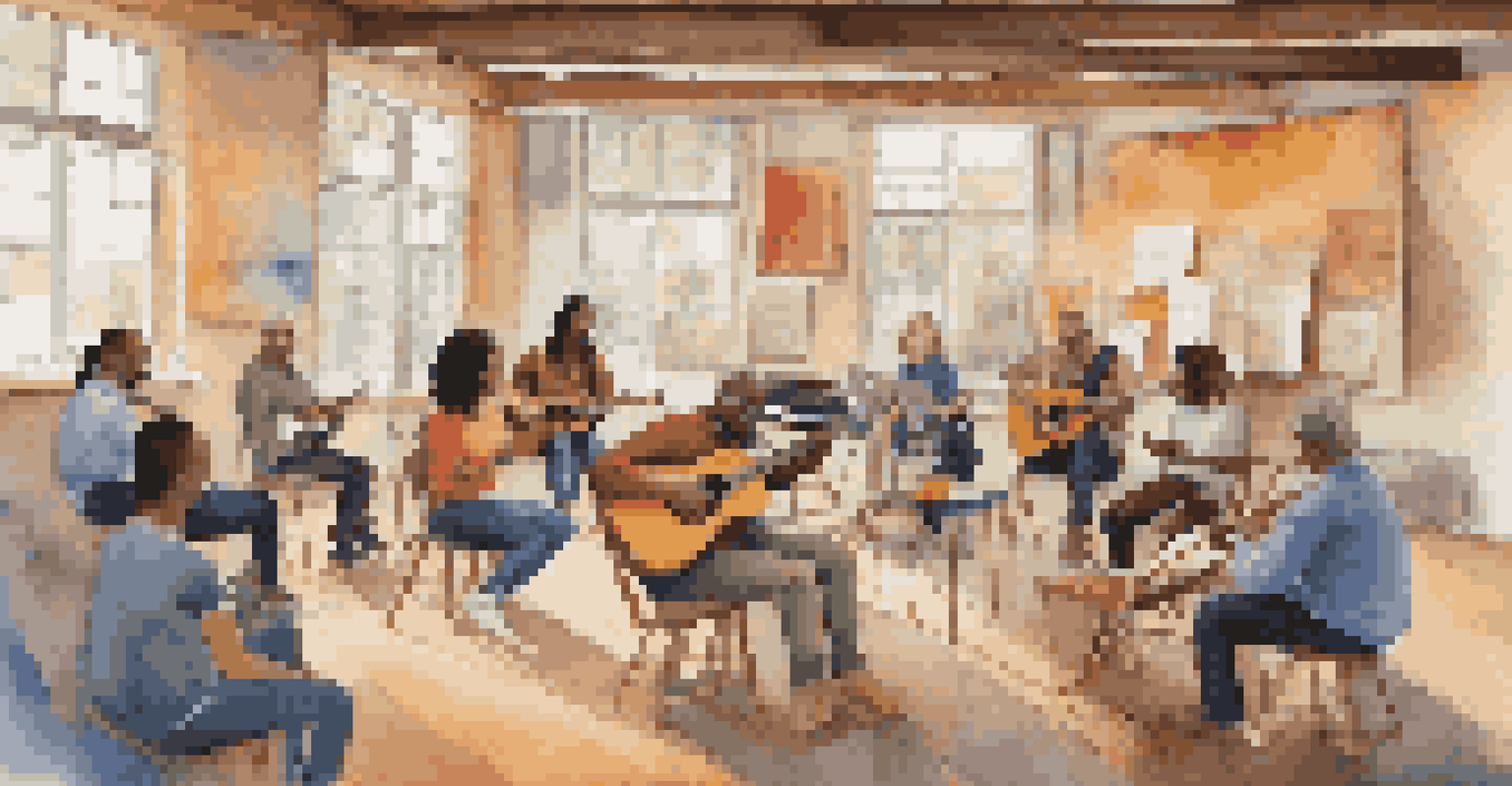Exploring Music Education as a Tool for Conflict Resolution Skills

Understanding Conflict Resolution in Today's World
Conflict resolution is a vital skill in our increasingly diverse society. It involves the ability to navigate disagreements in a constructive manner, promoting understanding rather than hostility. As interpersonal conflicts arise in various contexts, from schools to workplaces, the need for effective resolution strategies becomes more pressing.
Music can change the world because it can change people.
Many individuals struggle with conflict, often resorting to avoidance or escalation. This can lead to misunderstandings and further discord. However, a proactive approach to conflict resolution can transform disagreements into opportunities for growth and learning.
Incorporating music education into this framework can provide unique tools for developing these essential skills. Music encourages collaboration, communication, and empathy, setting the stage for effective conflict resolution.
The Role of Music Education in Emotional Expression
Music serves as a universal language, allowing individuals to express emotions that might be difficult to articulate verbally. This emotional expression is crucial in conflict situations, where feelings often run high. By engaging with music, students learn to identify and articulate their emotions, paving the way for healthier communication.

For instance, songwriting can be a powerful exercise in processing feelings. When students write lyrics about their experiences, they can reflect on their emotions and gain insight into their conflicts. This practice not only enhances emotional intelligence but also fosters a deeper understanding of others' perspectives.
Music Enhances Conflict Resolution
Integrating music education fosters essential skills like emotional expression, collaboration, and empathy, which are crucial for resolving conflicts.
Encouraging emotional expression through music helps to create an environment where students feel safe discussing their conflicts. This sense of safety is essential for fostering open dialogues, ultimately leading to resolution.
Building Collaboration Through Group Music Activities
Group music activities, such as ensemble playing or choir, inherently require collaboration and teamwork. Students must learn to listen to each other, compromise, and work towards a common goal. These experiences mirror the dynamics of conflict resolution, where collaboration is key to finding solutions.
The power of music makes all the difference in the world. It can heal, inspire, and unite.
In these settings, students not only develop musical skills but also learn how to appreciate different viewpoints. For example, while playing in a band, each musician must respect the contributions of their peers, creating a culture of mutual respect. This practice can directly translate to resolving conflicts in other areas of life.
By fostering collaboration in music education, students gain firsthand experience in navigating differences. This prepares them to approach conflicts with an open mind and a willingness to engage with diverse opinions.
Encouraging Empathy and Understanding Through Music
Empathy is a cornerstone of effective conflict resolution, and music is a powerful tool for cultivating this essential trait. Through exposure to diverse musical genres and cultures, students can learn to appreciate different perspectives and experiences. This understanding can help them approach conflicts with a more empathetic lens.
For example, listening to music from various cultures can open students' eyes to different ways of life and emotional expressions. This exposure encourages them to consider viewpoints other than their own, fostering a deeper sense of connection with others. As a result, they become more adept at navigating conflicts in a respectful manner.
Empathy Through Musical Exposure
Exposure to diverse musical genres helps students appreciate different perspectives, enhancing their ability to approach conflicts with empathy.
Music also allows for shared experiences, such as participating in a concert or musical event. These moments create bonds among individuals, further enhancing empathy and understanding, which are crucial for resolving conflicts.
Developing Communication Skills Through Musical Expression
Effective communication is integral to resolving conflicts, and music education provides an engaging platform for developing these skills. Through discussions about musical pieces, students learn to articulate their thoughts and feelings clearly. This practice not only enhances their verbal communication but also teaches them the importance of active listening.
For instance, when discussing the emotions conveyed in a piece of music, students must share their interpretations while being open to others' perspectives. This exchange fosters an environment of dialogue and respect, which is essential for conflict resolution.
Moreover, teaching students to provide constructive feedback during music lessons equips them with vital communication tools. They learn how to express critique in a manner that promotes growth rather than defensiveness, a skill that is directly applicable to resolving conflicts.
The Impact of Music on Stress and Emotional Regulation
Conflict often arises from heightened emotions and stress, making emotional regulation a key component of resolution. Music has been shown to reduce stress and promote relaxation, allowing individuals to approach conflicts with a clearer mindset. By incorporating music education into their lives, students can learn to manage their emotions more effectively.
For example, engaging in music-making activities, such as playing an instrument or singing, can serve as a therapeutic outlet for stress. This practice can help students process their emotions rather than react impulsively during conflicts. As they cultivate emotional regulation, they become better equipped to handle disagreements calmly.
Real-World Applications of Music
Music programs in schools and communities demonstrate the effectiveness of using music as a medium for dialogue and conflict resolution.
Ultimately, music education can serve as a valuable resource for emotional well-being, enabling students to approach conflicts with a level head and a willingness to resolve issues constructively.
Real-World Applications of Music in Conflict Resolution
The principles learned through music education can be applied in real-world situations, demonstrating its effectiveness as a conflict resolution tool. Schools and community organizations have begun integrating music programs into conflict resolution initiatives, showcasing its impact. These programs often use music as a medium for dialogue and understanding.
For example, community workshops that involve collaborative songwriting can enable participants to express their conflicts and work towards solutions together. This approach not only fosters creativity but also builds relationships among individuals, reinforcing the idea that resolution is a shared journey.

Such real-world applications highlight the potential of music education to bridge divides and foster understanding. As more organizations recognize the power of music in resolving conflicts, we can expect to see its influence grow in various settings.
Conclusion: Embracing Music Education for Conflict Resolution
In conclusion, music education emerges as a powerful tool for developing conflict resolution skills. By fostering emotional expression, collaboration, empathy, communication, and emotional regulation, music serves as a comprehensive platform for personal and interpersonal growth. As students navigate conflicts, the lessons learned through music can equip them with the skills necessary for effective resolution.
As educators and communities continue to embrace the role of music in conflict resolution, we can anticipate a generation of individuals who approach disagreements with creativity and understanding. This shift not only benefits individuals but also contributes to a more harmonious society.
Ultimately, investing in music education is an investment in the future—one that promotes peace, collaboration, and empathy in a world that desperately needs these qualities.